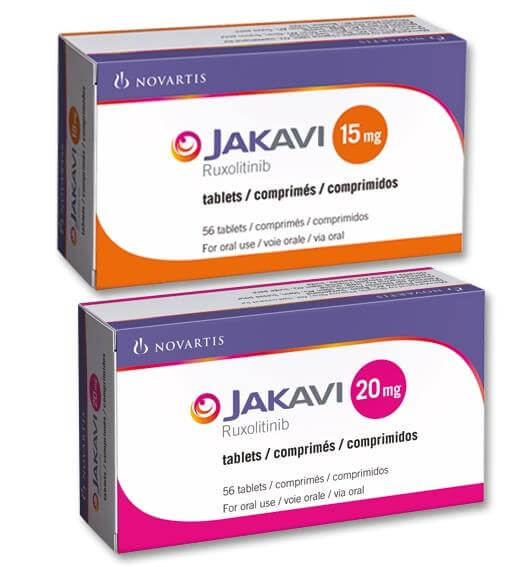Jakafi (ruxolitinib) is a type of JAK inhibitor that is used to treat myelofibrosis. Jakafi does not cure myelofibrosis, but can help to control the symptoms of the disease and slow down its progression. The exact cause of myelofibrosis is not known, but it is thought to occur as a result of mutations in the bone marrow cells.
Jakafi works by blocking the activity of specific proteins called Janus kinases (JAKs), which play a role in regulating the activity of the immune system and the production of blood cells.
In myelofibrosis, the activity of JAKs is thought to be dysregulated, which contributes to its development. By blocking JAKs, Jakafi can help to relieve symptoms, and can also help to slow down the progression of the disease.
There is ongoing research aimed at gaining a deeper understanding of the underlying mechanisms and the role of JAKs in the development and progression of the disease. Nevertheless, Jakafi has been shown to be effective in relieving symptoms and slowing down the progression of myelofibrosis in some patients, making it an important treatment option for individuals with this disease.
Jakafi, like all JAK inhibitors, can cause a variety of side effects, some of which can be mild and temporary, while others can be more serious and long-lasting. Some common mild side effects of Jakafi include:
- Low platelet count (thrombocytopenia): Platelets are the cells in the blood that help to form clots and stop bleeding. JAK inhibitors can sometimes cause a decrease in the number of platelets, which can increase the risk of bleeding and bruising.
- Anemia: Jakafi can also cause a reduction in the number of red blood cells, which can lead to anemia and symptoms such as fatigue, weakness, and shortness of breath.
- Skin rashes or itching: Some patients taking Jakafi may experience skin rashes or itching, which can be uncomfortable or even painful.
Not all patients will experience these side effects, and their severity can vary from person to person. If you are taking Jakafi and any of these symptoms persist or get worse, contact your doctor or pharmacist as soon as possible. They will be able to determine the best course of action for your individual case.
There are some rare but serious side effects that can occur with the use of JAK inhibitors like Jakafi. These include:
- Tumor lysis syndrome (TLS): TLS is a condition that can occur when cancer cells break down and release their contents into the bloodstream. This can lead to a buildup of waste products in the blood and can cause symptoms such as nausea, vomiting, and confusion.
- Liver problems: JAK inhibitors can sometimes cause liver problems, such as increased levels of liver enzymes in the blood. This can be a sign of liver damage.
- Infections: JAK inhibitors can weaken the immune system, making it more difficult for the body to fight off infections such as pneumonia or sepsis.
- Blood clots: JAK inhibitors can increase the risk of blood clots, which can be life-threatening if they occur in the lungs or heart.
- Decreased white blood cell count (neutropenia): JAK inhibitors can also cause a decrease in the number of white blood cells, which are important for fighting off infections.
These side effects are rare and may not occur in all patients. If you experience any concerning symptoms, such as chest pain, shortness of breath, or severe fever, it is important to seek medical attention right away.
There are some conditions or factors that may contraindicate the use of Jakafi for the treatment of myelofibrosis. It’s important to talk to your doctor about any conditions or factors that may contraindicate the use of Jakafi for you. These include:
- Pregnancy or breastfeeding: JAK inhibitors have not been studied in pregnant or breastfeeding women and their safety has not been established. Tell your doctor if you are planning to fall pregnant while under this treatment.
- Liver problems: Jakafi can cause liver problems, so if you have liver disease or liver problems, you may be advised against using Jakafi.
- Low white blood cell count: If you have a low white blood cell count, you may be at increased risk of serious infections while taking Jakafi. Your doctor should monitor your white blood cell count while you are taking the medication and may adjust your dose if necessary.
- Blood clots: If you have a history of blood clots or are at increased risk of developing blood clots, you may be at increased risk of experiencing serious blood clots while taking Jakafi.
- Infections: If you have a current or recent infection, your doctor may advise against starting Jakafi until the infection has cleared.
The main symptoms of myelofibrosis can vary from person to person, but some of the most common ones include:
- Fatigue and weakness
- Pain or fullness below the ribs on the left side
- Abdominal swelling or bloating
- Night sweats
- Weight loss
- Itching (pruritus)
- Bone pain
- Enlarged spleen (splenomegaly), which can lead to a feeling of fullness or discomfort in the upper left abdomen
- Bruising or bleeding more easily than usual
- Repeated infections
- Anemia (low red blood cell count), which can cause fatigue and weakness
It’s important to note that many people with myelofibrosis may not experience any symptoms in the early stages of the disease. Symptoms may become more apparent as the disease progresses.
Myelofibrosis can affect people of any age, although it is most commonly diagnosed in people over the age of 60. The disease can affect both men and women. However, some studies have suggested that myelofibrosis may be slightly more common in men.
Other risk factors, such as exposure to certain chemicals, radiation, and certain medical conditions, may also increase the risk of developing myelofibrosis.
Jakafi works by targeting specific proteins called Janus kinases (JAKs), which are involved in the development and progression of myelofibrosis.












